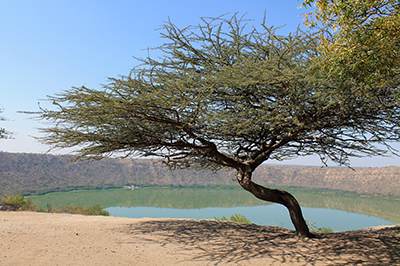Every year, thousands of meteors fall to the earth. Most burn up in the atmosphere but, if they’re large enough, they can hit the ground and leave a crater.
Meteors have been hitting the earth since the planet was formed. Most meteor impact craters are thought of as static and well understood. However, technologies like X-ray diffraction (XRD) are shedding new light on meteor impact craters.
Instruments like our portable TERRA® XRD analyzer have enabled scientists to concentrate on a more targeted analytical approach, enabling very specific, specialized research. XRD provides the quantitative mineralogy of crystalline substances. One example of where XRD is being used to facilitate a targeted analytical approach is the Lonar crater in India. The Lonar crater was created by a meteor that impacted sometime during the Pleistocene epoch. Today, the crater is filled with water and is known as Lonar Lake. Because the meteor is one of the only examples of an impact that took place in an area made of basalt, a type of volcanic rock, it’s of special interest to geologists. |  Lonar Lake, India |
The previous bulk analytical approach at the site has been sporadic over the decades and not very targeted. This has led to some ambiguous and often conflicting conclusions. Associates at Virginia Commonwealth University collaborated with Olympus XRD Scientist Jose Brum for a recent study, “Characterization of nanoparticles in ejecta fallout of Lonar Crater, India.” This study is aimed at clarifying some of the ambiguity and the least understood characteristics of this site. As a result, new answers have led to a better understanding as well as new questions. Additional time and effort need to be devoted to further the understanding of not only this impact
Read the full paper:
www.researchgate.net/project/CHARACTERIZATION-OF-NANOPARTICLES-IN-EJECTA-FALLOUT-OF-LONAR-CRATER-INDIA
Abstract
Nanoparticles formed within the ejecta plume are thought to play an important role in the catastrophic events due to meteorite impacts. However, the mode of origin of these nanoparticles in the ejecta fallout is still not clearly known due to its poor preservation potential and alteration. To understand the development of the nano-phase in the ejecta fallout, isolated magnetic particles from the ejecta blanket of the Lonar Crater in India were analyzed using an Olympus TERRA portable XRD analyzer, a transmission electron microscope (TEM), and a high-sensitivity scanning electron microscope (SEM) equipped with energy dispersive spectrum analyzer (EDS). The studied particles were found as spatially segregated from each other and are comprised of both Fe-Ti oxide as determined by (electron energy loss spectroscopy (EELS) as well as Fe(1-x)Nix alloy as determined by selected area electron diffraction (SAED) with all nanoparticles having an average diameter (D) ≈3.6 nm. The presence of single domain crystalline nanoparticles in the ejecta fallout supports its formation due to vapor-solid condensation within the impact ejecta plume.
Related Content
Here’s the Dirt on Using XRD Technology to Identify the Origin of Soils
5 Advantages of Olympus XRD Analyzers over Conventional XRD Instruments
Out of this World: Olympus XRD on Mars
Get In Touch

